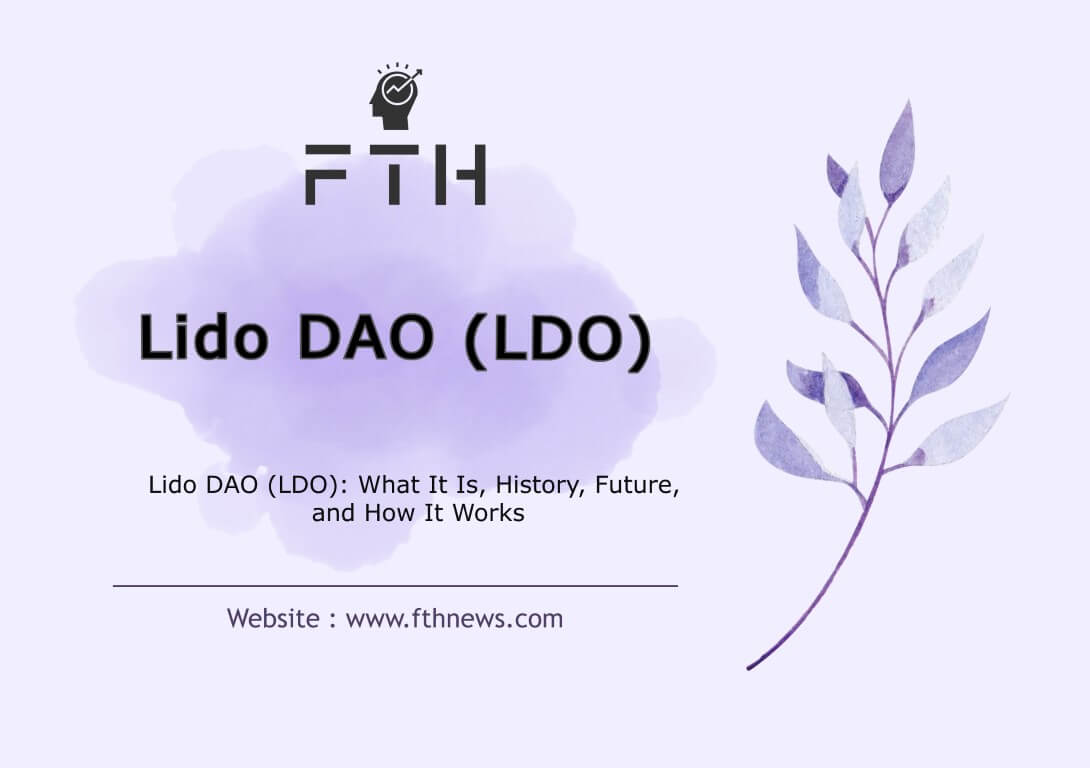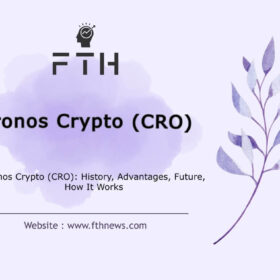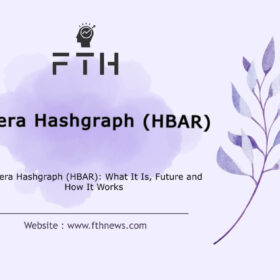
Lido DAO (LDO): What It Is, History, Advantages, Future, and How It Works
Lido DAO (LDO) The transition from Ethereum (ETH) to ETH 2.0 marked a significant step in addressing the challenges faced by the Ethereum network. However, the early stages of ETH 2.0 are not without their own set of issues. To become a validator, users are required to stake a multiple of 32ETH, locking these assets on the network for a specified period, restricting their use elsewhere.
Enter Lido DAO, a revolutionary solution designed to tackle the obstacles posed by ETH 2.0. Through its derivative token, stETH, Lido DAO unlocks the potential of ETH initially tied up in the network, making it available for use in various protocols. Commanding an impressive 80% market share in the ETH 2.0 landscape, the parent token, LDO, has demonstrated robust performance, experiencing steady growth on the charts. With an initial price around $1.50, LDO has surged to its peak at $18.62, reflecting an astonishing 1200% increase within a year.
What is Lido DAO?
Lido DAO stands as the staking solution for ETH 2.0, addressing the liquidity challenges posed by asset locking. Liquid staking, the practice of receiving tradable tokens in exchange for deposited assets, is at the core of Lido DAO’s functionality.
Established in December 2020, just weeks after the launch of ETH 2.0, Lido DAO operates as a Decentralized Autonomous Organization (DAO). Key contributors include prominent entities such as P2P Capital, KR1, Semantic Ventures, and support from renowned investors like Kain Warwick, Banteg, and Julien Bouteloup.
Boasting over $13 billion in stakes within its first year, Lido DAO initially focused on Ethereum but is now extending its services to other blockchain networks, including Terra and Solana. One distinctive feature setting it apart is its commitment to decentralization, offering high Annual Percentage Rates (APR) of 4.8%, 8.1%, and 6.6% for Ethereum, Terra, and Solana staking, respectively.
Lido DAO Team Members, Validators, and Partners
Several independent self-governing organizations contribute to the management of the Lido platform, bringing a wealth of experience and expertise:
1. CryptoCobain:
- A team of theoretical leaders with a substantial following of 440k on Twitter. CryptoCobain’s involvement adds both theoretical insights and a significant social media presence to the Lido ecosystem.
2. Banteg:
- A key member of the core development team at Yarn Finance. Banteg’s expertise in DeFi development contributes to the technical backbone of Lido DAO, ensuring its robust functionality.
3. ParaFi Capital:
- Focused on blockchain solutions within the DeFi space, ParaFi Capital is an investor in various blockchain projects. Their involvement with Lido reflects a commitment to supporting innovative solutions within the decentralized finance landscape.
Validators and Partners:
- Lido DAO has garnered support from notable validators, showcasing the project’s credibility and potential for success. Key validators include Coinbase Ventures, Alameda Research, and Three Arrows Capital. These entities bring significant resources and expertise, contributing to the security and reliability of the Lido network.
History of Lido DAO
The Lido project was initiated in December 2020, shortly after the implementation of the Ethereum 2 Beacon Chain. The project emerged in response to challenges inherent in digital currency staking, particularly in ETH staking on the Ethereum network. One such challenge is the requirement for users to stake in multiples of 32 ETH units, creating operational obstacles that demand technical and specialized knowledge.
Moreover, staked Ether tokens face a lock-in during the initial launch phase of Ethereum 2.0, restricting their use in other protocols. Lido DAO was conceived to address these challenges, providing a more accessible and flexible approach to staking on the Ethereum network.
As the project continues to evolve, the diverse expertise of its team, support from validators, and strategic partnerships position Lido DAO as a significant player in the dynamic landscape of decentralized finance.
Lido Digital Currency (LDO)
LDO, the native token of the Lido DAO project, plays a pivotal role in facilitating the Liquid staking service. With a total supply capped at 1 billion units, 312,951,153.96 LDO units are currently in circulation.
The digital currency’s allocation schedule within the Lido DAO is as follows:
- Treasury: 36.32%
- Investors: 22.18%
- Validators and holders: 6.5%
- Early developers: 20%
- Founders and future employees: 15%
This decentralized ownership structure empowers LDO holders to participate in governance decisions, preserving the platform’s decentralization. Holders can vote on matters shaping the future of the platform.
Since December 2020, LDO tokens have been fully locked for one year, allowing transferability from December 2021 onward, emphasizing the commitment to a phased and controlled release.
How Does the Lido DAO Platform Work?
While Lido DAO initially gained prominence on the Ethereum network, its utility has expanded to encompass various blockchain networks, including Solana (stSOL), Polygon (stMATIC), Terra (stLUNA), and Cosmos (stATOM). Although each network may have nuanced differences, we will focus on elucidating how Lido functions on the Ethereum network, and the general process is applicable to other integrated networks.
1. Staking:
- Users can stake any desired amount in ETH on the Lido platform.
- Lido receives the chosen ETH amount from users.
2. Minting:
- In return for the staked ETH, Lido mints stETH tokens and returns them to the user.
- The value of the minted stETH tokens is in a 1:1 ratio with the original amount of staked Ethereum.
3. DeFi Integration:
- stETH tokens are versatile and can be employed throughout the decentralized finance (DeFi) ecosystem for potentially higher returns.
- This eliminates the necessity to lock multiples of 32 ETH in ETH 2.0 to earn rewards.
Lido DAO Platform Features:
1. Staking Platform:
- The Stake Lido platform enables users to stake any amount of ETH using their wallet.
- The exchange rate from ETH to stETH maintains a 1:1 ratio.
- A transaction fee of $38.40 and a bonus fee of 10% are deducted from total rewards.
2. Curve Liquidity Pool:
- Lido integrates with the Curve liquidity pool, which is a decentralized exchange for stablecoins on Ethereum.
- This integration facilitates the seamless trading, purchase, and utilization of stETH.
3. MakerDAO Platform:
- Users can leverage the MakerDAO platform, connecting their wallet and using stETH tokens as collateral to secure loans.
4. Lido Referral Program:
- Lido DAO introduces a referral program where a referrer can earn 1% of the total ETH stake in LDO tokens.
- A whitelist system is in place for the referral program, ensuring that only approved partners receive rewards.
The Lido DAO platform empowers users to stake ETH without the traditional lock-in requirements, providing flexibility and access to a wide array of opportunities within the DeFi landscape. As of now, the platform continues to evolve, bringing liquid staking solutions to multiple blockchain networks.
Advantages of Lido DAO
1. Decentralization:
- Lido DAO stands out for its complete decentralization. Ownership of LDO grants individuals the right to vote on the platform’s future direction, ensuring a democratic and inclusive governance model.
2. Flexibility in Staking:
- Lido DAO provides unparalleled flexibility in staking. Users can stake and withdraw any amount of Ethereum 2.0, Terra, or Solana, eliminating the requirement to stake in multiples of 32 ETH. This flexibility enhances accessibility for a broader range of users.
Disadvantages of Lido DAO
1. High Transaction Costs:
- LDO, being an ERC20 token, comes with higher transaction costs compared to other tokens within the same standard. Users should be mindful of these costs, particularly when conducting frequent transactions.
2. Security Risks:
- Despite being considered a secure platform, Lido DAO, like any open-source platform, is susceptible to potential security risks. The nature of Lido being built on ETH 2.0, a blockchain still under development, adds an additional layer of complexity. Bugs in the open-source code could be exploited, and any risks identified in ETH 2.0 may have implications for Lido DAO.
3. Adoption Risks:
- Lido DAO’s performance is intricately tied to the adoption rate of ETH 2.0. If the transition to ETH 2.0 doesn’t occur at the anticipated pace, it may lead to significant fluctuations in the prices of both ETH and stETH. The adoption risks, coupled with the ongoing development of ETH 2.0, pose potential challenges for Lido DAO’s stability.
It’s important for users to weigh the advantages against the potential drawbacks when considering participation in the Lido DAO ecosystem. As with any innovative platform, staying informed about updates, security measures, and market dynamics is crucial for making well-informed decisions.
Lido DAO Roadmap
Lido’s current focus revolves around enhancing decentralization and trustlessness, particularly in the realm of adding new nodes to the existing set. Several strategic measures have been implemented to achieve these goals:
- Increased Client Variety:
- An emphasis on diversifying the clients used by operators to enhance the overall robustness of the network.
- Capital Distribution Control:
- Ensuring that no single operator possesses more than one percent of the total staked capital, promoting a distributed and resilient network.
- Geographical and Legal Diversity:
- Encouraging the geographic and legal diversity of nodes, ensuring a broad and inclusive representation across different regions.
- Optimal Private Key Management:
- Adoption of state-of-the-art solutions in private key management and security to safeguard the integrity of the network.
- Operator Autonomy:
- Granting operators control over their respective nodes while ensuring their income is sufficient to establish a profitable and reliable business.
Proposed Solutions for Improvement:
- Distributed Validator Technology (DVT):
- Gradual adoption of DVT, where validators propose or approve new blocks as a group in independent committees. This minimizes the risk associated with the poor performance of a single system validator and facilitates the inclusion of new, untested operators within committees consisting of a reliable majority of nodes.
- Performance Score Card and Stake Allocation:
- Implementation of a node performance scorecard, with stake allocation based on demonstrated performance. New nodes must exhibit acceptable performance levels to access platform capital.
Governance Enhancement Initiatives:
- Preventing Sudden Changes:
- Introduction of new processes, such as time locks or providing veto rights to stETH holders, to prevent abrupt changes at the platform level and enhance stability.
- Facilitating Fork Possibility:
- Enabling the possibility of a Lido fork as a last resort. This approach allows the protocol to be revived in a different form, owned by a new user community, with minimal adjustments to the Lido governance contract in the event of a deviation from the intended path.
As Lido continues to evolve, these measures and solutions underscore the commitment to creating a decentralized and resilient infrastructure while ensuring an effective gove
Where to Buy LDO Tokens?
LDO tokens, the native currency of Lido DAO, are available on various centralized and decentralized exchanges:
Centralized Exchanges:
- Binance
- Gate
- Baybit
- Gemini
- Kraken
Decentralized Exchanges:
- SushiSwap
- UniSwap
- Curve
Wallets for Storing LDO Tokens
As an ERC-20 token, LDO can be securely stored in a variety of wallets:
Hardware Wallets:
- Ledger
- Trezor
- SafePal
Software Wallets:
- Metamask
- TrustWallet
- [Other common wallets]
Understanding Staking in Lido
Lido is a groundbreaking platform offering Liquid Staking for Ethereum and several other Proof-of-Stake networks. Here’s a breakdown of how staking in Lido works:
- Token Conversion:
- Send Ether to the Lido platform and receive stETH tokens in return.
- Collateral for Validators:
- Your staked Ether serves as collateral for network validators, allowing you to share in their rewards.
- Revenue Distribution:
- 90% of the revenue generated by validators, including block rewards and transaction fees, is distributed among stETH holders. The remaining percentage is allocated to the protocol treasury and validators.
Decision-Making Process in Lido DAO
Normal Process:
- Public Discussion:
- Decisions begin with a public discussion on the research forum, where feedback is sought from the community.
- Proposal Submission:
- Following the public discussion, a proposal is prepared and submitted for public vote, typically after a week. The voting occurs on the Snapshot protocol, with the weight of votes proportional to each participant’s LDO token holdings. As Snapshot operates off-chain, no transaction fees are incurred.
- Aragon Platform Vote:
- If a proposal passes the Snapshot vote with at least 5% of total tokens voting for an option, it moves to the Aragon platform. Here, multiple proposals may be combined to save on transaction fees. The Aragon vote lasts 72 hours, and for approval, it requires at least 5% of total tokens to vote for an option, with more than half of the participating tokens supporting the option.
Emergency Procedure:
- In emergency cases, steps one and two may be skipped, and voting can commence immediately on the Aragon platform. While it’s possible to expedite the process, it’s recommended to provide an explanation in a forum post.
Specialized Subgroups:
- LNOSG (Registry of Operators):
- Administers the Registry of Operators, aiming for decentralization without the need for authorization and trust.
- LEGO (Grants and Finance):
- Manages grants and finances projects related to ecosystem growth.
- REWARDS Committee:
- Manages incentives for expanding Lido’s Liquid Staking products and determines strategies to incentivize liquidity providers.
- RCC (Budget and Salary Administration):
- Administers the budget and salary department, overseeing financial payments related to wages and budgeting.
- Referral Program Committee:
- Responsible for Lido Ecosystem’s referral incentive programs, working to attract more users and capital through a referral marketing program.
The robust decision-making structure, combining community engagement, decentralized voting, and specialized committees, ensures transparency, inclusivity, and effective governance within Lido DAO.
Conclusion
Staking plays a crucial role in ensuring the security and continuity of blockchain networks. Lido, with its Liquid Staking service, aims to simplify participation in Ethereum 2.0. By providing stETH tokens, it enhances capital efficiency and reduces barriers for users. The protocol’s focus on selecting competent validators minimizes risks for investors. However, criticisms around concentration risks have prompted Lido to take steps toward decentralization, including the implementation of methods such as Distributed Validator Technology (DVT) in the upcoming year.
As the protocol evolves, these measures are anticipated to enhance security, reduce risks, and contribute to the broader decentralization of the network.
Lido DAO has shown promising growth, but like any investment, it comes with risks. It’s crucial to research thoroughly and consider your risk tolerance before investing.
Lido DAO is a decentralized finance (DeFi) platform that facilitates liquid staking for assets like Ethereum, offering flexibility and accessibility in staking.
Yes, Lido DAO is considered a legitimate and transparent platform in the decentralized finance space, but it’s essential to stay updated on its developments and community feedback.
Lido DAO emphasizes security and has implemented measures to protect user funds. However, as with any crypto investment, it’s crucial to exercise caution and follow best practices for securing your assets.
Lido’s popularity stems from its innovative approach to liquid staking, providing users with the ability to stake assets flexibly. Its transparent governance and partnerships contribute to its widespread appeal in the DeFi community.














